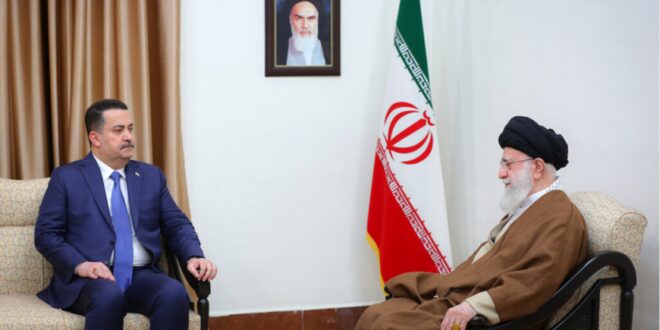Iraqi Prime Minister Mohammed Shia al-Sudani’s Tehran visit came only one day after US Secretary of State Antony Blinken was in Baghdad, amid an uptick in Iran-backed militia attacks on US bases in the region in response to Israel’s war on Hamas.
Iran’s Supreme Leader Ayatollah Ali Khamenei said pressure must build on the United States to end Israel’s attacks on the Gaza Strip, his official website reported on Monday.
“The Islamic Republic of Iran and Iraq can act in liaison and play an effective part in this regard,” Khamenei told Iraqi Prime Minister Mohammed Shia al-Sudani, who was on a brief visit to Tehran that was focused on coordinating diplomacy at the height of the deadly Israel-Hamas conflict.
The Iranian leader renewed his condemnation of Washington’s support for Israel, saying the US government was “truly an accomplice to the Zionist crimes in Gaza.” He claimed that there was more than enough evidence proving that “America was directly leading the war,” without which Israel would be unable to press ahead. The hard-line cleric called for urgent humanitarian help for Gaza and “an end to the crimes by the Zionist entity.”
The Iraqi premier’s visit also occurred only one day after US Secretary of State Antony Blinken was in Baghdad on an unannounced trip. Iran-backed Shiite militia groups have claimed responsibility for a chain of attacks targeting US bases in Iraq and Syria over the past two weeks. Those proxies, which Iran refers to as “resistance groups,” had pledged to hit US interests if Israel refused to halt its attacks on the Gaza Strip, which were triggered by Hamas’ bloody Oct. 7 operation in southern Israel.
Reporting by Iran’s state-controlled media did not highlight a link between Blinken’s visit to Baghdad and that of Sudani to Tehran. But Iraq’s Shafaaq news said Sudani was carrying messages to the Iranian leadership, including a US warning to restrain the armed proxies.
In Baghdad, Blinken had already announced that the threats coming from Iran-aligned militias were unacceptable and that “we will take every necessary step to protect our people.”
Since the outbreak of the Israel-Hamas war, the United States has relentlessly pushed to stop other actors from being dragged in. Iran has held the same position in its official statements as well but has also warned that proxies could be activated at any moment.
Tehran also insists that the United States “is not being sincere” in its overall stance on the Israel-Hamas war. At a joint press conference with Sudani in Tehran, President Ebrahim Raisi said US statements about efforts for humanitarian pauses in Gaza were “absolute lies.” Proof of that, according to Raisi, was Washington’s veto at the UN Security Council of an Oct. 18 draft resolution proposing a cease-fire.
Separately, Foreign Minister Hossein Amir-Abdollahian told Iran’s state TV on Monday that Tehran had received messages from Washington indicating that the latter was seeking a “cease-fire” in Gaza. He said, however, that the US support for the Israeli “massacre” was not in line with those messages.
Meanwhile, a spokesperson for the US National Security Council dismissed Amir-Abdollahian’s claim about the content of the message as “categorically false.” In an interview with CNN, the unnamed official said the message was indeed a warning to Tehran not to expand the ongoing conflict.
آمریکا از هفته گذشته در صدد آتش بس انسانی بود. ما پیام آنها را دریافت کردیم، آنها «کاملا نادرست» می گویند. البته هم زمان بازی جنگ را علیه غزه و کرانه باختری فلسطین مدیریت میکنند. ریاکاری و نسلکشی علیه غزه را متوقف کنید.
— H.Amirabdollahian امیرعبداللهیان (@Amirabdolahian) November 6, 2023The back and forth continued as Amir-Abdollahian declared on his X account that Tehran had indeed received the cease-fire message. He called on the United States to give up “hypocrisy” and put an end to what he called “the Gaza genocide.”
 Eurasia Press & News
Eurasia Press & News




